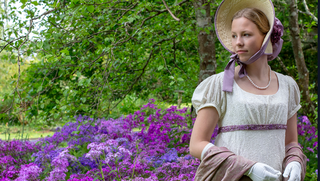Optimism
How Period Dramas Like "Bridgerton" Soothe and Inspire
Escapism, a good character, and a happy ending can build optimism and esteem.
Posted June 9, 2021 Reviewed by Ekua Hagan
Key points
- Human brains love symmetry and completion, so audiences are soothed by the predictable patterns of period drama stories.
- Connection to characters in period dramas lets viewers "try on" different identities and explore new ways of being.
- Period dramas explore archetypal themes which invite the audience consider core ideas, such as the desire to be seen and loved.
We learned a lot of things during the stress and uncertainty of 2020, including that media can be a wonderful escape into another time and place. Period dramas are at the top of my list. You don’t have to be a devoted fan to reap the psychological benefits. Rich settings and archetypal characters of this genre transport us into different worlds.
Dramas such as Bridgerton and Downton Abbey are full of social intrigue and the promise of a happy ending that provides a positive emotional payoff. As the characters go through trials, challenges, love, success, and costume changes, we travel with them, experiencing their emotional highs and lows.

Stories Feel Good Because They Have Predictable Patterns
Our brains love symmetry and completion. The pattern of this genre is comfortingly predictable, like a good ritual should be. Our brains are busy luxuriating in the release of mood-impacting neurotransmitters, like cortisol, dopamine, and oxytocin as we respond to the challenges, betrayal, romance, and, of course, the happy resolution of the narrative arc, making an emotionally satisfying journey.
Period dramas are one of my favorite forms of self-care. They worked wonders when we were isolated, anxious, and needed to get away, and they will continue to do the job as we readjust to post-COVID normal. We may have vaccines, but there’s still a lot of uncertainty in the world.
The Appeal of Desire, Love, and Social Connection
Many popular period dramas have romance at their core, such as Bridgerton, Outlander, and my favorite, the BBC version of Pride and Prejudice. They focus on relatable characters and relationships: We all yearn to connect and be loved authentically and unconditionally. The target audience skews female and it's easy to speculate that a lot of the appeal for women lies in well-drawn characters and a complex social milieu. In the best of this genre, women have “spunk” and do not just exist as objects of beauty.
Period dramas also center around the emotional intricacy of human relationships and, to be fair, some clever casting of attractive male protagonists and female leads who are appealing and spirited but not threatening. With or without the help of their often-reluctant companions and love objects, the female protagonist faces challenges and overcomes obstacles despite the social and technological obstacles of the time.
Even in the rarified strata of society, there is always an underdog to root for who desires nothing more than to be recognized and admired for substance rather than beauty. Where Jane Austen was a master of subtle commentary on the constraints of social norms to a woman’s detriment, the more recent Bridgerton adaptation is more socially aware. These are themes, however, that many will recognize and find resonant. Those audience members are duly rewarded for their attention and emotional investment by seeing someone of substance and quality win out in the end.
Stories Let Us Practice for Real Life
Humans are social animals, instinctively curious about others. We learn by observing others and seeing how it all works out. It’s a healthy form of voyeurism. Fiction, however, lets us be voyeurs and participants emotionally as well as virtually. Aided by our ability to visualize and project, we psychologically transport into a story, imagine what it would be like to be there, and observe how characters navigate to learn the social norms of the story world. Rich settings, period costumes, and a well-crafted story world enhance our sense of presence in the visual worlds created for Daphne Bridgerton, Elizabeth Bennet, and Claire Fraser to navigate.
Trappings of wealth and royalty add to the ambiance because they allow us to be members of an exclusive world, even if only for a while. Since our brains make sense of information by comparing it to our existing schema and experiences, period dramas add another subtle layer of engagement. They continually pique our curiosity as we compare what we see to what we know. We are not bothered by historical inaccuracies when our imagination is rich in possibilities. Fiction gives the producers the latitude to gloss over the less glamorous parts of history and keep us firmly in a fantasy-induced suspension of disbelief.
The Benefits of Fandom and Character Connection
Episodic dramas let us visit a fascinating world over time and, thanks to streaming and DVRs, we can visit and revisit on-demand. We can seriously dig in and get to know our favorite characters. You don't have to be a die-hard fan to benefit from a character connection. The feeling of knowing and attachment to a fictional character may be one-sided but it can be very meaningful in its effects.
Parasocial relationships amplify our emotional investment in a character’s choices, paths, and outcomes. In doing so, they enhance our ability to make personal meaning out of the narrative. The ability to express love and affection is one way to strengthen willpower, which can enhance our self-efficacy and self-esteem.
By connecting with characters, we can also find personal validation and inspiration; We can "try on" some of “our” characters' strengths and feel normalized by our commonalities real or imagined. The behaviors and choices we watch on screen can become part of our mental inventory of thoughts and actions. We can apply them to our lives or give new meaning to the choices of the past and the opportunities in the future.
The Short and Long of Stories: From Feeling Good to Gaining Insights
Bridgerton, Downtown Abbey, and Pride and Prejudice are pleasurable entertainment. They can make us happy, lighten our mood, and leave us feeling good when the storyline ends “as it should.” But stories like these do more. By providing a place to go when life gets hard, they allow us to rest and regroup.
Fiction provides many different plots, but they are built on archetypal themes. They let us consider big issues or scary ideas, such as the desire to be seen and loved for who we really are or grieving over a loss, in safe, bite-sized morsels. They give us hope and optimism for the future and encourage us to believe in ourselves.
Period dramas can be unrealistic — like the time-traveling of Outlander — yet the universal truths in fiction can inspire us, shifting our perspective and making us feel a little more equipped to deal with life’s challenges. There is no better form of self-care.




